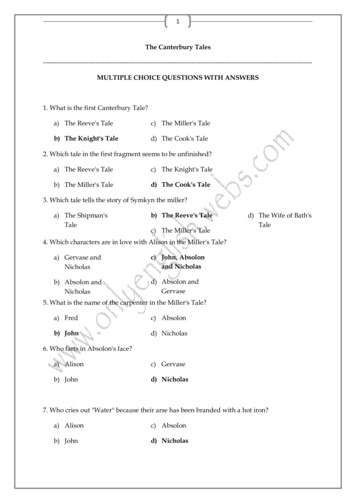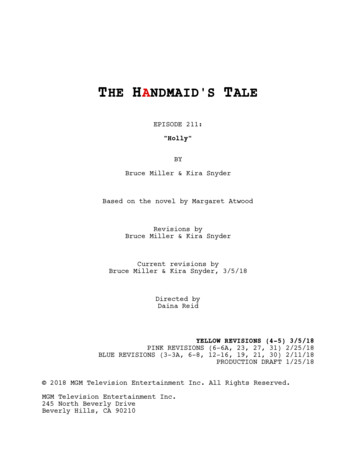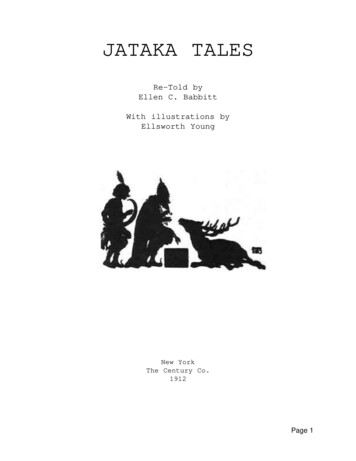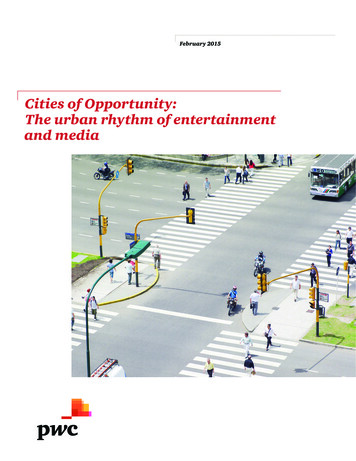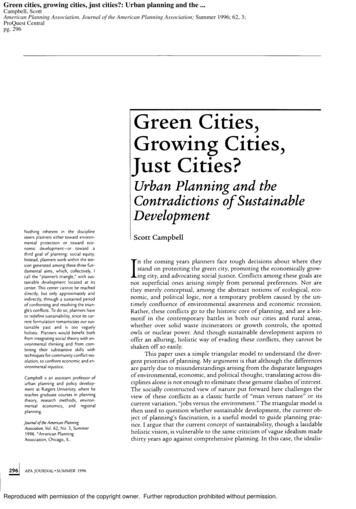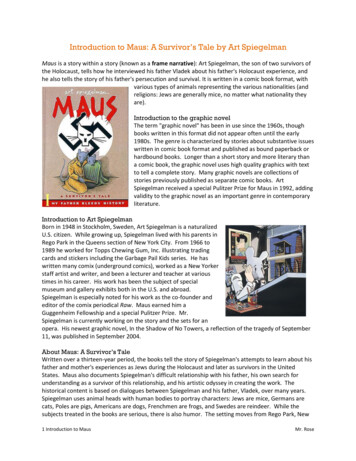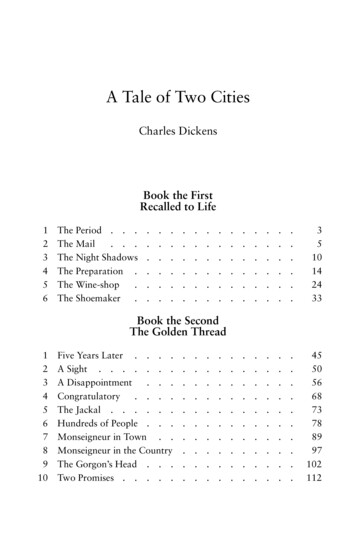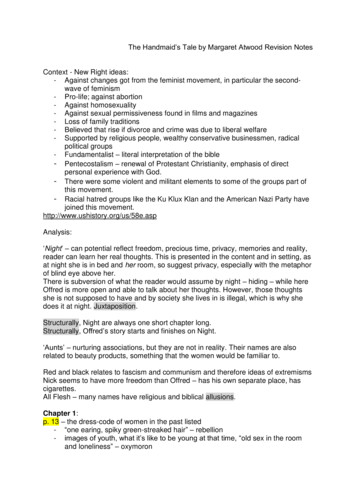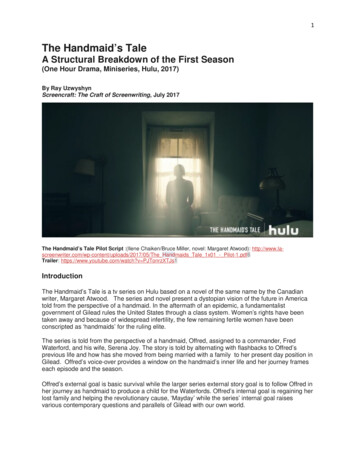
Transcription
A Tale of Two CitiesCharles DickensThis eBook is designed and published by Planet PDF. For more freeeBooks visit our Web site at http://www.planetpdf.com
A Tale of Two CitiesBook the First—Recalled to Life2 of 670
eBook brought to you byA Tale of Two CitiesCreate, view, and edit PDF. Download the free trial version.IThe PeriodIt was the best of times, it was the worst of times, it wasthe age of wisdom, it was the age of foolishness, it was theepoch of belief, it was the epoch of incredulity, it was theseason of Light, it was the season of Darkness, it was thespring of hope, it was the winter of despair, we hadeverything before us, we had nothing before us, we wereall going direct to Heaven, we were all going direct theother way—in short, the period was so far like the presentperiod, that some of its noisiest authorities insisted on itsbeing received, for good or for evil, in the superlativedegree of comparison only.There were a king with a large jaw and a queen with aplain face, on the throne of England; there were a kingwith a large jaw and a queen with a fair face, on thethrone of France. In both countries it was clearer thancrystal to the lords of the State preserves of loaves andfishes, that things in general were settled for ever.It was the year of Our Lord one thousand sevenhundred and seventy-five. Spiritual revelations wereconceded to England at that favoured period, as at this.3 of 670
A Tale of Two CitiesMrs. Southcott had recently attained her five-andtwentieth blessed birthday, of whom a prophetic private inthe Life Guards had heralded the sublime appearance byannouncing that arrangements were made for theswallowing up of London and Westminster. Even theCock-lane ghost had been laid only a round dozen ofyears, after rapping out its messages, as the spirits of thisvery year last past (supernaturally deficient in originality)rapped out theirs. Mere messages in the earthly order ofevents had lately come to the English Crown and People,from a congress of British subjects in America: which,strange to relate, have proved more important to thehuman race than any communications yet receivedthrough any of the chickens of the Cock-lane brood.France, less favoured on the whole as to mattersspiritual than her sister of the shield and trident, rolledwith exceeding smoothness down hill, making papermoney and spending it. Under the guidance of herChristian pastors, she entertained herself, besides, withsuch humane achievements as sentencing a youth to havehis hands cut off, his tongue torn out with pincers, and hisbody burned alive, because he had not kneeled down inthe rain to do honour to a dirty procession of monkswhich passed within his view, at a distance of some fifty or4 of 670
A Tale of Two Citiessixty yards. It is likely enough that, rooted in the woods ofFrance and Norway, there were growing trees, when thatsufferer was put to death, already marked by theWoodman, Fate, to come down and be sawn into boards,to make a certain movable framework with a sack and aknife in it, terrible in history. It is likely enough that in therough outhouses of some tillers of the heavy lands adjacentto Paris, there were sheltered from the weather that veryday, rude carts, bespattered with rustic mire, snuffed aboutby pigs, and roosted in by poultry, which the Farmer,Death, had already set apart to be his tumbrils of theRevolution. But that Woodman and that Farmer, thoughthey work unceasingly, work silently, and no one heardthem as they went about with muffled tread: the rather,forasmuch as to entertain any suspicion that they wereawake, was to be atheistical and traitorous.In England, there was scarcely an amount of order andprotection to justify much national boasting. Daringburglaries by armed men, and highway robberies, tookplace in the capital itself every night; families were publiclycautioned not to go out of town without removing theirfurniture to upholsterers’ warehouses for security; thehighwayman in the dark was a City tradesman in the light,and, being recognised and challenged by his fellow5 of 670
A Tale of Two Citiestradesman whom he stopped in his character of ‘theCaptain,’ gallantly shot him through the head and rodeaway; the mall was waylaid by seven robbers, and theguard shot three dead, and then got shot dead himself bythe other four, ‘in consequence of the failure of hisammunition:’ after which the mall was robbed in peace;that magnificent potentate, the Lord Mayor of London,was made to stand and deliver on Turnham Green, by onehighwayman, who despoiled the illustrious creature insight of all his retinue; prisoners in London gaols foughtbattles with their turnkeys, and the majesty of the law firedblunderbusses in among them, loaded with rounds of shotand ball; thieves snipped off diamond crosses from thenecks of noble lords at Court drawing-rooms; musketeerswent into St. Giles’s, to search for contraband goods, andthe mob fired on the musketeers, and the musketeers firedon the mob, and nobody thought any of these occurrencesmuch out of the common way. In the midst of them, thehangman, ever busy and ever worse than useless, was inconstant requisition; now, stringing up long rows ofmiscellaneous criminals; now, hanging a housebreaker onSaturday who had been taken on Tuesday; now, burningpeople in the hand at Newgate by the dozen, and nowburning pamphlets at the door of Westminster Hall; to6 of 670
A Tale of Two Citiesday, taking the life of an atrocious murderer, and tomorrow of a wretched pilferer who had robbed a farmer’sboy of sixpence.All these things, and a thousand like them, came to passin and close upon the dear old year one thousand sevenhundred and seventy-five. Environed by them, while theWoodman and the Farmer worked unheeded, those twoof the large jaws, and those other two of the plain and thefair faces, trod with stir enough, and carried their divinerights with a high hand. Thus did the year one thousandseven hundred and seventy-five conduct their Greatnesses,and myriads of small creatures—the creatures of thischronicle among the rest—along the roads that lay beforethem.7 of 670
A Tale of Two CitiesIIThe MailIt was the Dover road that lay, on a Friday night late inNovember, before the first of the persons with whom thishistory has business. The Dover road lay, as to him,beyond the Dover mail, as it lumbered up Shooter’s Hill.He walked up hill in the mire by the side of the mail, asthe rest of the passengers did; not because they had theleast relish for walking exercise, under the circumstances,but because the hill, and the harness, and the mud, and themail, were all so heavy, that the horses had three timesalready come to a stop, besides once drawing the coachacross the road, with the mutinous intent of taking it backto Blackheath. Reins and whip and coachman and guard,however, in combination, had read that article of warwhich forbade a purpose otherwise strongly in favour ofthe argument, that some brute animals are endued withReason; and the team had capitulated and returned totheir duty.With drooping heads and tremulous tails, they mashedtheir way through the thick mud, floundering andstumbling between whiles, as if they were falling to pieces8 of 670
A Tale of Two Citiesat the larger joints. As often as the driver rested them andbrought them to a stand, with a wary ‘Wo-ho! so-hothen!’ the near leader violently shook his head andeverything upon it—like an unusually emphatic horse,denying that the coach could be got up the hill. Wheneverthe leader made this rattle, the passenger started, as anervous passenger might, and was disturbed in mind.There was a steaming mist in all the hollows, and it hadroamed in its forlornness up the hill, like an evil spirit,seeking rest and finding none. A clammy and intenselycold mist, it made its slow way through the air in ripplesthat visibly followed and overspread one another, as thewaves of an unwholesome sea might do. It was denseenough to shut out everything from the light of thecoach-lamps but these its own workings, and a few yardsof road; and the reek of the labouring horses steamed intoit, as if they had made it all.Two other passengers, besides the one, were ploddingup the hill by the side of the mail. All three were wrappedto the cheekbones and over the ears, and wore jack-boots.Not one of the three could have said, from anything hesaw, what either of the other two was like; and each washidden under almost as many wrappers from the eyes ofthe mind, as from the eyes of the body, of his two9 of 670
A Tale of Two Citiescompanions. In those days, travellers were very shy ofbeing confidential on a short notice, for anybody on theroad might be a robber or in league with robbers. As tothe latter, when every posting-house and ale-house couldproduce somebody in ‘the Captain’s’ pay, ranging fromthe landlord to the lowest stable non-descript, it was thelikeliest thing upon the cards. So the guard of the Dovermail thought to himself, that Friday night in November,one thousand seven hundred and seventy-five, lumberingup Shooter’s Hill, as he stood on his own particular perchbehind the mail, beating his feet, and keeping an eye and ahand on the arm-chest before him, where a loadedblunderbuss lay at the top of six or eight loaded horsepistols, deposited on a substratum of cutlass.The Dover mail was in its usual genial position that theguard suspected the passengers, the passengers suspectedone another and the guard, they all suspected everybodyelse, and the coachman was sure of nothing but the horses;as to which cattle he could with a clear conscience havetaken his oath on the two Testaments that they were notfit for the journey.‘Wo-ho!’ said the coachman. ‘So, then! One more pulland you’re at the top and be damned to you, for I havehad trouble enough to get you to it!—Joe!’10 of 670
A Tale of Two Cities‘Halloa!’ the guard replied.‘What o’clock do you make it, Joe?’‘Ten minutes, good, past eleven.’‘My blood!’ ejaculated the vexed coachman, ‘and notatop of Shooter’s yet! Tst! Yah! Get on with you! ‘The emphatic horse, cut short by the whip in a mostdecided negative, made a decided scramble for it, and thethree other horses followed suit. Once more, the Dovermail struggled on, with the jack-boots of its passengerssquashing along by its side. They had stopped when thecoach stopped, and they kept close company with it. Ifany one of the three had had the hardihood to propose toanother to walk on a little ahead into the mist anddarkness, he would have put himself in a fair way ofgetting shot instantly as a highwayman.The last burst carried the mail to the summit of the hill.The horses stopped to breathe again, and the guard gotdown to skid the wheel for the descent, and open thecoach-door to let the passengers in.‘Tst! Joe!’ cried the coachman in a warning voice,looking down from his box.‘What do you say, Tom?’They both listened.‘I say a horse at a canter coming up, Joe.’11 of 670
A Tale of Two Cities‘I say a horse at a gallop, Tom,’ returned the guard,leaving his hold of the door, and mounting nimbly to hisplace. ‘Gentlemen! In the kings name, all of you!’With this hurried adjuration, he cocked hisblunderbuss, and stood on the offensive.The passenger booked by this history, was on thecoach-step, getting in; the two other passengers were closebehind him, and about to follow. He remained on thestep, half in the coach and half out of; they re-mained inthe road below him. They all looked from the coachmanto the guard, and from the guard to the coachman, andlistened. The coachman looked back and the guard lookedback, and even the emphatic leader pricked up his ears andlooked back, without contradicting.The stillness consequent on the cessation of therumbling and labouring of the coach, added to the stillnessof the night, made it very quiet indeed. The panting of thehorses communicated a tremulous motion to the coach, asif it were in a state of agitation. The hearts of thepassengers beat loud enough perhaps to be heard; but atany rate, the quiet pause was audibly expressive of peopleout of breath, and holding the breath, and having thepulses quickened by expectation.12 of 670
A Tale of Two CitiesThe sound of a horse at a gallop came fast and furiouslyup the hill.‘So-ho!’ the guard sang out, as loud as he could roar.‘Yo there! Stand! I shall fire!’The pace was suddenly checked, and, with muchsplashing and floundering, a man’s voice called from themist, ‘Is that the Dover mail?’‘Never you mind what it is!’ the guard retorted. ‘Whatare you?’‘IS that the Dover mail?’‘Why do you want to know?’‘I want a passenger, if it is.’‘What passenger?’‘Mr. Jarvis Lorry.’Our booked passenger showed in a moment that it washis name. The guard, the coachman, and the two otherpassengers eyed him distrustfully.‘Keep where you are,’ the guard called to the voice inthe mist, ‘because, if I should make a mistake, it couldnever be set right in your lifetime. Gentleman of the nameof Lorry answer straight.’‘What is the matter?’ asked the passenger, then, withmildly quavering speech. ‘Who wants me? Is it Jerry?’13 of 670
A Tale of Two Cities("I don’t like Jerry’s voice, if it is Jerry,’ growled theguard to himself. ‘He’s hoarser than suits me, is Jerry.’)‘Yes, Mr. Lorry.’‘What is the matter?’‘A despatch sent after you from over yonder. T. andCo.’‘I know this messenger, guard,’ said Mr. Lorry, gettingdown into the road—assisted from behind more swiftlythan politely by the other two passengers, whoimmediately scrambled into the coach, shut the door, andpulled up the window. ‘He may come close; there’snothing wrong.’‘I hope there ain’t, but I can’t make so ‘Nation sure ofthat,’ said the guard, in gruff soliloquy. ‘Hallo you!’‘Well! And hallo you!’ said Jerry, more hoarsely thanbefore.‘Come on at a footpace! d’ye mind me? And if you’vegot holsters to that saddle o’ yourn, don’t let me see yourhand go nigh ‘em. For I’m a devil at a quick mistake, andwhen I make one it takes the form of Lead. So now let’slook at you.’The figures of a horse and rider came slowly throughthe eddying mist, and came to the side of the mail, wherethe passenger stood. The rider stooped, and, casting up his14 of 670
eBook brought to you byA Tale of Two CitiesCreate, view, and edit PDF. Download the free trial version.eyes at the guard, handed the passenger a small foldedpaper. The rider’s horse was blown, and both horse andrider were covered with mud, from the hoofs of the horseto the hat of the man.‘Guard!’ said the passenger, in a tone of quiet businessconfidence.The watchful guard, with his right hand at the stock ofhis raised blunderbuss, his left at the barrel, and his eye onthe horseman, answered curtly, ‘Sir.’‘There is nothing to apprehend. I belong to Tellson’sBank. You must know Tellson’s Bank in London. I amgoing to Paris on business. A crown to drink. I may readthis?’‘If so be as you’re quick, sir.’He opened it in the light of the coach-lamp on thatside, and read—first to himself and then aloud: ‘‘Wait atDover for Mam’selle.’ It’s not long, you see, guard. Jerry,say that my answer was, RECALLED TO LIFE.’Jerry started in his saddle. ‘That’s a Blazing strangeanswer, too,’ said he, at his hoarsest.‘Take that message back, and they will know that Ireceived this, as well as if I wrote. Make the best of yourway. Good night.’15 of 670
A Tale of Two CitiesWith those words the passenger opened the coach-doorand got in; not at all assisted by his fellow-passengers, whohad expeditiously secreted their watches and purses intheir boots, and were now making a general pretence ofbeing asleep. With no more definite purpose than toescape the hazard of originating any other kind of action.The coach lumbered on again, with heavier wreaths ofmist closing round it as it began the descent. The guardsoon replaced his blunderbuss in his arm-chest, and,having looked to the rest of its contents, and havinglooked to the supplementary pistols that he wore in hisbelt, looked to a smaller chest beneath his seat, in whichthere were a few smith’s tools, a couple of torches, and atinder-box. For he was furnished with that completenessthat if the coach-lamps had been blown and stormed out,which did occasionally happen, he had only to shuthimself up inside, keep the flint and steel sparks well offthe straw, and get a light with tolerable safety and ease (ifhe were lucky) in five minutes.‘Tom!’ softly over the coach roof.‘Hallo, Joe.’‘Did you hear the message?’‘I did, Joe.’‘What did you make of it, Tom?’16 of 670
A Tale of Two Cities‘Nothing at all, Joe.’‘That’s a coincidence, too,’ the guard mused, ‘for Imade the same of it myself.’Jerry, left alone in the mist and darkness, dismountedmeanwhile, not only to ease his spent horse, but to wipethe mud from his face, and shake the wet out of his hatbrim, which might be capable of holding about half agallon. After standing with the bridle over his heavilysplashed arm, until the wheels of the mail were no longerwithin hearing and the night was quite still again, heturned to walk down the hill.‘After that there gallop from Temple Bar, old lady, Iwon’t trust your fore-legs till I get you on the level,’ saidthis hoarse messenger, glancing at his mare. ‘‘Recalled tolife.’ That’s a Blazing strange message. Much of thatwouldn’t do for you, Jerry! I say, Jerry! You’d be in aBlazing bad way, if recalling to life was to come intofashion, Jerry!’17 of 670
A Tale of Two CitiesIIIThe Night ShadowsA wonderful fact to reflect upon, that every humancreature is constituted to be that profound secret andmystery to every other. A solemn consideration, when Ienter a great city by night, that every one of those darklyclustered houses encloses its own secret; that every roomin every one of them encloses its own secret; that everybeating heart in the hundreds of thousands of breasts there,is, in some of its imaginings, a secret to the heart nearest it!Something of the awfulness, even of Death itself, isreferable to this. No more can I turn the leaves of this dearbook that I loved, and vainly hope in time to read it all.No more can I look into the depths of this unfathomablewater, wherein, as momentary lights glanced into it, I havehad glimpses of buried treasure and other thingssubmerged. It was appointed that the book should shutwith a spring, for ever and for ever, when I had read but apage. It was appointed that the water should be locked inan eternal frost, when the light was playing on its surface,and I stood in ignorance on the shore. My friend is dead,my neighbour is dead, my love, the darling of my soul, is18 of 670
A Tale of Two Citiesdead; it is the inexorable consolidation and perpetuation ofthe secret that was always in that individuality, and whichI shall carry in mine to my life’s end. In any of the burialplaces of this city through which I pass, is there a sleepermore inscrutable than its busy inhabitants are, in theirinnermost personality, to me, or than I am to them?As to this, his natural and not to be alienatedinheritance, the messenger on horseback had exactly thesame possessions as the King, the first Minister of State, orthe richest merchant in London. So with the threepassengers shut up in the narrow compass of onelumbering old mail coach; they were mysteries to oneanother, as complete as if each had been in his own coachand six, or his own coach and sixty, with the breadth of acounty between him and the next.The messenger rode back at an easy trot, stoppingpretty often at ale-houses by the way to drink, butevincing a tendency to keep his own counsel, and to keephis hat cocked over his eyes. He had eyes that assortedvery well with that decoration, being of a surface black,with no depth in the colour or form, and much too neartogether—as if they were afraid of being found out insomething, singly, if they kept too far apart. They had asinister expression, under an old cocked-hat like a three19 of 670
A Tale of Two Citiescornered spittoon, and over a great muffler for the chinand throat, which descended nearly to the wearer’s knees.When he stopped for drink, he moved this muffler withhis left hand, only while he poured his liquor in with hisright; as soon as that was done, he muffled again.‘No, Jerry, no!’ said the messenger, harping on onetheme as he rode. ‘It wouldn’t do for you, Jerry. Jerry,you honest tradesman, it wouldn’t suit YOUR line ofbusiness! Recalled—! Bust me if I don’t think he’d been adrinking!’His message perplexed his mind to that degree that hewas fain, several times, to take off his hat to scratch hishead. Except on the crown, which was raggedly bald, hehad stiff, black hair, standing jaggedly all over it, andgrowing down hill almost to his broad, blunt nose. It wasso like Smith’s work, so much more like the top of astrongly spiked wall than a head of hair, that the best ofplayers at leap-frog might have declined him, as the mostdangerous man in the world to go over.While he trotted back with the message he was todeliver to the night watchman in his box at the door ofTellson’s Bank, by Temple Bar, who was to deliver it togreater authorities within, the shadows of the night tooksuch shapes to him as arose out of the message, and took20 of 670
A Tale of Two Citiessuch shapes to the mare as arose out of HER private topicsof uneasiness. They seemed to be numerous, for she shiedat every shadow on the road.What time, the mail-coach lumbered, jolted, rattled,and bumped upon its tedious way, with its three fellowinscrutables inside. To whom, likewise, the shadows of thenight revealed themselves, in the forms their dozing eyesand wandering thoughts suggested.Tellson’s Bank had a run upon it in the mail. As thebank passenger— with an arm drawn through the leathernstrap, which did what lay in it to keep him from poundingagainst the next passenger, and driving him into hiscorner, whenever the coach got a special jolt—nodded inhis place, with half-shut eyes, the little coach-windows,and the coach-lamp dimly gleaming through them, andthe bulky bundle of opposite passenger, became the bank,and did a great stroke of business. The rattle of the harnesswas the chink of money, and more drafts were honouredin five minutes than even Tellson’s, with all its foreign andhome connection, ever paid in thrice the time. Then thestrong-rooms underground, at Tellson’s, with such of theirvaluable stores and secrets as were known to the passenger(and it was not a little that he knew about them), openedbefore him, and he went in among them with the great21 of 670
A Tale of Two Citieskeys and the feebly-burning candle, and found them safe,and strong, and sound, and still, just as he had last seenthem.But, though the bank was almost always with him, andthough the coach (in a confused way, like the presence ofpain under an opiate) was always with him, there wasanother current of impression that never ceased to run, allthrough the night. He was on his way to dig some one outof a grave.Now, which of the multitude of faces that showedthemselves before him was the true face of the buriedperson, the shadows of the night did not indicate; but theywere all the faces of a man of five-and- forty by years, andthey differed principally in the passions they expressed, andin the ghastliness of their worn and wasted state. mentation, succeeded one another; so did varieties ofsunken cheek, cadaverous colour, emaciated hands andfigures. But the face was in the main one face, and everyhead was prematurely white. A hundred times the dozingpassenger inquired of this spectre:‘Buried how long?’The answer was always the same: ‘Almost eighteenyears.’22 of 670
A Tale of Two Cities‘You had abandoned all hope of being dug out?’‘Long ago.’‘You know that you are recalled to life?’‘They tell me so.’‘I hope you care to live?’‘I can’t say.’‘Shall I show her to you? Will you come and see her?’The answers to this question were various andcontradictory. Sometimes the broken reply was, ‘Wait! Itwould kill me if I saw her too soon.’ Sometimes, it wasgiven in a tender rain of tears, and then it was, ‘Take meto her.’ Sometimes it was staring and bewildered, and thenit was, ‘I don’t know her. I don’t understand.’After such imaginary discourse, the passenger in hisfancy would dig, and dig, dig—now with a spade, nowwith a great key, now with his hands—to dig thiswretched creature out. Got out at last, with earth hangingabout his face and hair, he would suddenly fan away todust. The passenger would then start to himself, and lowerthe window, to get the reality of mist and rain on hischeek.Yet even when his eyes were opened on the mist andrain, on the moving patch of light from the lamps, and thehedge at the roadside retreating by jerks, the night23 of 670
A Tale of Two Citiesshadows outside the coach would fall into the train of thenight shadows within. The real Banking-house by TempleBar, the real business of the past day, the real strongrooms, the real express sent after him, and the real messagereturned, would all be there. Out of the midst of them,the ghostly face would rise, and he would accost it again.‘Buried how long?’‘Almost eighteen years.’‘I hope you care to live?’‘I can’t say.’Dig—dig—dig—until an impatient movement fromone of the two passengers would admonish him to pull upthe window, draw his arm securely through the leathernstrap, and speculate upon the two slumbering forms, untilhis mind lost its hold of them, and they again slid awayinto the bank and the grave.‘Buried how long?’‘Almost eighteen years.’‘You had abandoned all hope of being dug out?’‘Long ago.’The words were still in his hearing as just spoken—distinctly in his hearing as ever spoken words had been inhis life—when the weary passenger started to the24 of 670
A Tale of Two Citiesconsciousness of daylight, and found that the shadows ofthe night were gone.He lowered the window, and looked out at the risingsun. There was a ridge of ploughed land, with a ploughupon it where it had been left last night when the horseswere unyoked; beyond, a quiet coppice-wood, in whichmany leaves of burning red and golden yellow stillremained upon the trees. Though the earth was cold andwet, the sky was clear, and the sun rose bright, placid, andbeautiful.‘Eighteen years!’ said the passenger, looking at the sun.‘Gracious Creator of day! To be buried alive for eighteenyears!’25 of 670
A Tale of Two CitiesIVThe PreparationWhen the mail got successfully to Dover, in the courseof the forenoon, the head drawer at the Royal GeorgeHotel opened the coach-door as his custom was. He did itwith some flourish of ceremony, for a mail journey fromLondon in winter was an achievement to congratulate anadventurous traveller upon.By that time, there was only one adventurous travellerleft be congratulated: for the two others had been setdown at their respective roadside destinations. Themildewy inside of the coach, with its damp and dirtystraw, its disageeable smell, and its obscurity, was ratherlike a larger dog-kennel. Mr. Lorry, the passenger, shakinghimself out of it in chains of straw, a tangle of shaggywrapper, flapping hat, and muddy legs, was rather like alarger sort of dog.‘There will be a packet to Calais, tomorrow, drawer?’‘Yes, sir, if the weather holds and the wind setstolerable fair. The tide will serve pretty nicely at abouttwo in the afternoon, sir. Bed, sir?’26 of 670
eBook brought to you byA Tale of Two CitiesCreate, view, and edit PDF. Download the free trial version.‘I shall not go to bed till night; but I want a bedroom,and a barber.’‘And then breakfast, sir? Yes, sir. That way, sir, if youplease. Show Concord! Gentleman’s valise and hot waterto Concord. Pull off gentleman’s boots in Concord. (Youwill find a fine sea-coal fire, sir.) Fetch barber to Concord.Stir about there, now, for Concord!’The Concord bed-chamber being always assigned to apassenger by the mail, and passengers by the mail beingalways heavily wrapped up from head to foot, the roomhad the odd interest for the establishment of the RoyalGeorge, that although but one kind of man was seen to gointo it, all kinds and varieties of men came out of it.Consequently, another drawer, and two porters, andseveral maids and the landlady, were all loitering byaccident at various points of the road between theConcord and the coffee-room, when a gentleman of sixty,formally dressed in a brown suit of clothes, pretty wellworn, but very well kept, with large square cuffs and largeflaps to the pockets, passed along on his way to hisbreakfast.The coffee-room had no other occupant, thatforenoon, than the gentleman in brown. His breakfasttable was drawn before the fire, and as he sat, with its light27 of 670
A Tale of Two Citiesshining on him, waiting for the meal, he sat so still, that hemight have been sitting for his portrait.Very orderly and methodical he looked, with a hand oneach knee, and a loud watch ticking a sonorous sermonunder his flapped waist-coat, as though it pitted its gravityand longevity against the levity and evanescence of thebrisk fire. He had a good leg, and was a little vain of it, forhis brown stockings fitted sleek and close, and were of afine texture; his shoes and buckles, too, though plain, weretrim. He wore an odd little sleek crisp flaxen wig, settingvery close to his head: which wig, it is to be presumed,was made of hair, but which looked far more as though itwere spun from filaments of silk or glass. His linen, thoughnot of a fineness in accordance with his stockings, was aswhite as the tops of the waves that broke upon theneighbouring beach, or the specks of sail that glinted inthe sunlight far at sea. A face habitually suppressed andquieted, was still lighted up under the quaint wig by a pairof moist bright eyes that it must have cost their owner, inyears gone by, some pains to drill to the composed andreserved expression of Tellson’s Bank. He had a healthycolou
least relish for walking exercise, under the circumstances, but because the hill, and the harness, and the mud, and the mail, were all so heavy, that the horses had three times already come to a stop, besides once drawing the coach across the road, with the mutinous intent of taking it b

